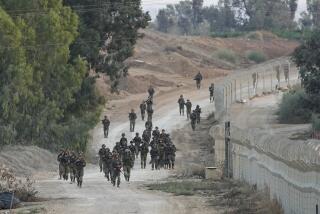Losing the Personal Edge in Iraq
- Share via
On April 9, 2003, Baghdad fell far faster than most media commentators, and even most military commanders, had expected. The U.S. armed forces looked invincible.
A year later, the perception is very different. The carnage in Iraq is front page news week in, week out. U.S. forces in Iraq are embattled on two fronts and appear unable to vanquish their foes. They have suffered three times more casualties since the fall of Baghdad than they did during the war itself. What accounts for this?
The answer to that question was provided by political scientist Barry Posen in the scholarly journal International Security last summer. His thesis was that “the United States enjoys command of the commons -- command of the sea, space and air.” No other country has naval, space or air forces remotely capable of challenging ours. But this edge slips away the closer U.S. forces get to the enemy. In “contested zones” -- “below 15,000 feet [altitude], within several hundred kilometers of the shore, and on land” -- even relatively unsophisticated foes have a good chance of inflicting serious harm on our troops.
This is precisely what we’ve seen in Iraq, where American soldiers have proved enticing targets for enemies armed with cheap, simple weapons like rocket-propelled grenades and homemade bombs. All the high-tech weapons in the U.S. arsenal are of little use against a foe you can’t find.
U.S. troops have little choice but to venture into such messy “contested zones” if they want to win the war on terrorism. Otherwise they will be limited to ineffectual gestures such as cruise missile strikes against terrorist training camps (like the ones Bill Clinton launched against Afghanistan in August 1998). Unfortunately, winning the close-in fight against guerrillas requires skills that the U.S. armed forces don’t possess in abundance. It requires, above all, the ability to generate “actionable” intelligence about who and where the terrorists are.
The only way to get good information in a place like Afghanistan or Iraq is to spend a lot of time there, drinking tea with the locals and earning their trust. But not many U.S. officials do that. All of the U.S. soldiers who spent the last year in Iraq have gone home or are about to. They are being replaced by an entirely new crew that will need months to figure out which sheiks and mullahs to cultivate. Likewise, in Afghanistan the military starts virtually from scratch every six to 12 months as new units rotate in and old ones leave.
The situation is no better among the diplomats and spies who are supposed to support military operations. As Greg Miller and Bob Drogin of the Los Angeles Times reported in February, many CIA agents who “take sensitive overseas assignments are willing to serve only 30-to-90-day rotations, a revolving-door approach that has undercut the agency’s ability to cultivate ties to warlords in Afghanistan or collect intelligence on the Iraqi insurgency.”
Both the CIA and the State Department allow officers to specialize in a particular region, but they can rarely spend too long actually living there without hurting their chances of promotion. They get ahead by being known at headquarters, not in the Afghan outback.
That’s also true in the Army, where Foreign Area officers who specialize in a particular region can kiss their chances of making general goodbye. Moreover, it’s common for CIA, military and State Department officers to be reassigned to a region far outside their expertise -- a Latin America specialist being sent to Asia, for instance. Sometimes this makes for a healthy influx of new ideas, but often it just wastes knowledge that took years to acquire.
For a better approach, we should emulate what the British did when they were engaged in many of the same places that currently bedevil us.
Look at the example of Gertrude Bell, a British intelligence agent, archeologist and diplomat who spent decades living and traveling in the Middle East and became known in the 1920s as the “uncrowned queen of Iraq.” Or Col. Robert Warburton, who spoke fluent Persian and Pashto and spent 18 years (1879-97) as the political officer in the Northwest Frontier Province of what is today Pakistan. He kept this volatile region (now a Taliban and Al Qaeda stronghold) quiet through his personal influence. “In an area where every male was habitually armed at all times,” historian Byron Farwell wrote, “he went about with only a walking stick.” Within a month of his retirement, the area was swept by an Islamic fundamentalist revolt that took thousands of British soldiers to put down.
The U.S. military has the best “smart” weapons in the world. But unless we get more smart, knowledgeable people like Warburton and Bell, we will always be at a major disadvantage in the war on terrorism.
More to Read
Sign up for Essential California
The most important California stories and recommendations in your inbox every morning.
You may occasionally receive promotional content from the Los Angeles Times.













